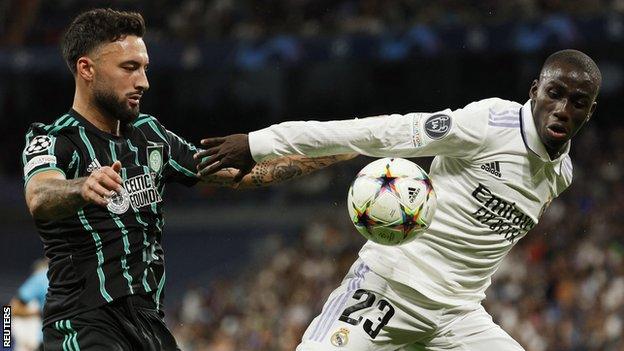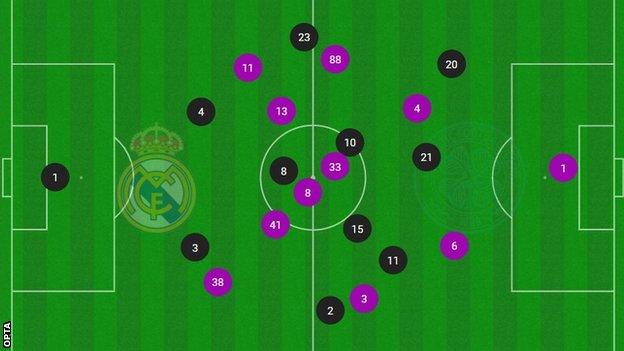Real Madrid 5-1 Celtic: How do Ange Postecoglou's side bridge Champions League gap?
- Published

Celtic's campaign ended with a 5-1 defeat against Real Madrid
Celtic manager Ange Postecoglou said he was "disappointed" but not "disheartened" as his side finished their Champions League campaign with a sobering loss in the Bernabeu.
The same themes were evident in the 5-1 loss to Real Madrid that have been there in every one of their six, winless, games in the group stage. Chances created. Chances missed. Chances conceded. Chances scored.
"Bridging that gap isn't immense but it's the most difficult bit to get," Postecoglou said afterwards. "You're talking about scoring goals at this level, which isn't the easiest thing to do."
But how can Celtic improve? If the Scottish champions defend their title and return to the Champions League next year, what must they do to fare better?
Take some of their many chances
The narrative about Celtic's campaign has revolved around taking chances or, rather, wasting them. And while it's not quite as simple as saying: 'if only they had been more clinical, they would have got more points', it certainly would have helped.
The stats are stark, and show Celtic created about as many scoring opportunities as they conceded. But the difference was the opposition were far more clinical.
Postecoglou's side had 80 shots across the six games - 30 of which were on target - but they only scored four goals. They conceded 79 shots - 32 of which hit the target - but 15 ended up in the back of the net.
Celtic's conversion rate was below 5% - a dreadful return. Had they been more lethal in front of goal, they might have at least managed a victory, particularly in the games against Shakhtar.
But overall their expected goals rating was 9.85, while their expected goals against was 11.45. So while converting opportunities was a major problem, conceding chances was a big issue too.
Altering the style of play a little
Postecoglou has been clear he won't change his attacking approach, but is a bit more pragmatism needed within it?
That does not mean suddenly becoming a defensive team, it just might mean tweaking things. It also means strengthening the side, particularly in central defence and midfield.
Injuries in this campaign, particularly to captain and midfield general Callum McGregor, did not help but generally Celtic were too open in the middle of the pitch.
Against Real, you can see the average positions of the midfield three is very high, along with the full-backs.

Celtic (purple) were caught with lots of bodies forward against Real Madrid
Taking that risk requires either total precision with the ball in attack to progress, or defenders who are extremely good at defending in wide areas and in one-v-one situations to snuff out counter-attacks. Or they could commit fewer bodies forward.
"In this competition you get exposed if you don't adapt," former Celtic goalkeeper Pat Bonner said on Sportsound.
"Nobody is saying he [Postecoglou] has to compromise on his attacking style and building through the thirds from the back. But they need to learn how to stay in the game against top opposition.
"Maybe getting the players to think slightly different. Instead of taking 80% risk of running forward, maybe they should sit a bit and help their colleague in midfield.
"They play with inverted full-backs not in a defensive role, but more to be in as a player who can get on the ball and take risks. They leave themselves slightly exposed."
Gain - or recruit - more experience
Another factor Postecoglou pointed to is the inexperience of his team. Of the regular starters, only McGregor and Joe Hart had played major minutes in the Champions League group stage before this season.
Playing at high-speed in fervent stadiums on the biggest stage for the first time does help partially explain a lack of composure in moments, with the ball and without. The latter has been a problem, with Celtic's frantic press often picked off.
Having a year of learning will certainly help if they can return next season, but it will likely require clever transfer dealings and retaining players, as well as signing better quality.
Players proven at this level are likely to be out of Celtic's price range, which means the current group have to learn, and even then it does not guarantee better results.
The likes of Club Bruges, who reached the last 16 this season, have proved you can improve through experience in the Champions League. But experience is only part of the equation.
Investment, and a good dose of luck with injuries are also required. It's a daunting task.
"I don't think it's one of these things where every year you're in it you get better," Postecoglou admitted. "That's not how it works at this level. There's some pretty good football clubs who haven't qualified for the next round this year.
"I've got no doubt our first job is to qualify next year, and if we're in it I think we'll make more of an impact but that doesn't mean it's going to be a massive leap. But I don't think it needs to be."

Get notifications, news, analysis and fan views for Celtic by downloading the BBC Sport app on Apple, external - Android, external - Amazon, external and hitting the bell icon on the club page
